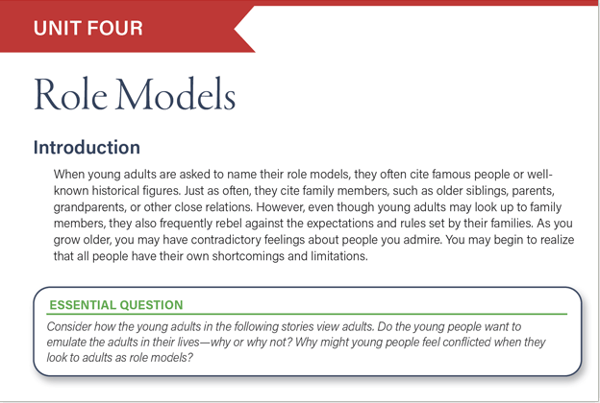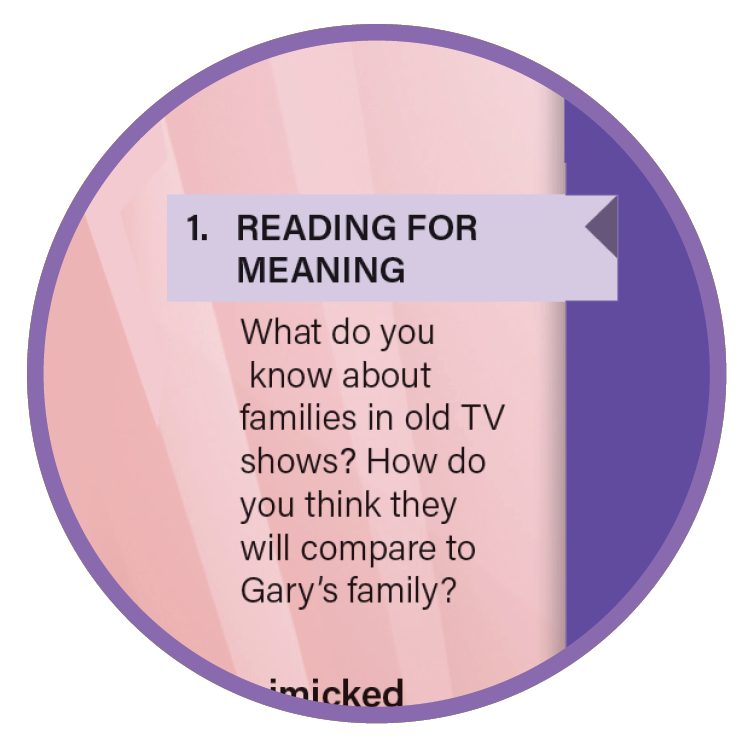Connections: Literature — Middle School
Grades 6–8
Connect Worlds, Empower Minds
Connections: Literature supports learners as they engage in the study of dynamic, relevant texts and brings the richness of diverse voices to students through literature.
Grounded in learning science, proven instructional strategies break down learning barriers and support academic growth.
- Connect students to a diverse world of reading and writing.
- Enable deep understanding, critical thinking, and effective communication.
- Empower academic growth and remove learning barriers.
ESSA Evidence—Demonstrates a Rationale

Perfection Learning engaged LearnPlatform by Instructure, a third-party edtech research company, to develop a logic model for Connections: Literature. The program has earned a Level IV designation (Demonstrates a Rationale).
Connect Students to a Diverse World of Reading & Writing

Themes and Essential Questions deepen literary study by guiding analysis, connecting texts to universal ideas, and fostering critical thinking.

Using relevant texts engages readers, making literature more meaningful, relatable, and impactful.

Students broaden perspectives, develop empathy, and build a deeper understanding of different experiences and cultures.

Reading related novels and nonfiction provides deeper context, strengthens understanding, and enhances critical thinking by connecting multiple perspectives and ideas.
Essential Questions & Themes Connect the Lessons & Skills
Enable Deep Understanding, Critical Thinking & Effective Communication

Before You Read
Reading for Meaning and Literary Lens skills are introduced to activate or build upon prior knowledge. Skills are color coded and reinforced throughout the reading passage.
During Reading Practice
Students pause and reflect to analyze the text-dependent Active Reading callouts placed throughout the selections. Callouts are labeled and color coded to indicate the skills focus. Think About It questions are in-text spiral reviews of previously taught skills to keep skills fresh and build automaticity.




After You Read
Students develop collaboration and higher-level thinking skills to demonstrate what they know. Tasks grow from basic comprehension skills to evaluation.
Depth of Knowledge (DOK) levels are provided in the Teacher Wraparound Edition for quick reference.

Writing in Response to Reading
Students practice text-based writing and on-demand writing using textual evidence to support their thoughts.
Comprehensive Writing Focus
Students write in response to reading and create their own fully developed writing piece within each unit. Writing is intended to be a synthesis of what they read and a reflection of their understanding.
Each unit wraps up with the writing prompt based on the unit Essential Question. The focus of Writing Focus outlines the key elements of the writing mode covering:
- Narrative
- Informational/Expository
- Argumentative
- Literary Analysis

Writing Instruction
Students have access to a full-length mentor text in the same genre of the writing mode. Think About It questions prompt the student to reflect on the author’s purpose and writing style.

Students analyze the structure and development of ideas in the mentor text and emulate these in their own writing.

Using student models is an effective strategy to demonstrate effective writing students can emulate.

All writing is not the same. The process writing steps the student through the unique considerations of the mode.

Help students organize ideas and structure their draft.

Students take a deeper dive into a writing skill—it’s like an embedded minilesson!

Empower Academic Growth & Remove Learning Barriers

Immersive Reader
Comprehension is the gateway to meaning, and state-of-the-art Immersive Reader technology delivers. ALL students have the power to:
- Adapt the passage based on their own learning needs.
- Translate the text into over 120 languages with audio support.
- Enhance learning with picture dictionary, line focus, parts of speech, and more.
- Customize readability by changing font type, text size, and background colors.
Interactive Editions
Students can easily:
- Mark up the text with highlighting.
- Add notes and capture ideas in a digital notebook.
- Cite textual evidence as they write in response to reading.


Interactive Activities
Apply learning objectives, synthesize evidence, and practice using a variety of items, organizers, and writing prompts.
Teacher Resources
Unit Opener & Goal Setting
Comprehensive teacher resources deliver instruction with ease
Teaching support offers questions to guide students in examining the unit theme and Essential Question, establish learning goals, and conduct small group discussions.


Editable Lesson Planners
Referenced in the Teacher Wraparound Edition, the editable planners are available online on Perfection Next®.
PowerPoint Presentations
Ready-made and editable presentations include embedded videos and models to build background knowledge and prepare students for learning.
Online Resources
Access additional writing supports like graphic organizers and editable rubrics are available online.

Differentiation Support

Reach the needs of all learners, from striving to thriving, with point-of-use teaching notes and suggestions for differentiation
Strategic Support—Offers content for a variety of teaching approaches to support the needs of striving readers.
Challenge & Extension—Materials provide opportunities for advanced leaners to respond to material at higher levels of complexity.
Emergent Bilingual Resource
Teachers have tips and tools readily available to provide the best learning environment for emergent bilingual learners.
Emergent Bilingual Learners
Support for students from beginning to advanced English proficiency levels are provided in the Teacher Wraparound Edition at point of use.

Assessment Resources Measure Student Understanding
A comprehensive Diagnostic Pretest assesses students’ skills at the beginning of the year to get a baseline measurement of what they know.

Identify student understanding and proficiency with these selection-based checks. Each question is tagged with a DOK level and model answers for open response questions.

Monitor student understanding of the selection or quickly assess the skills taught in the lesson.

Measure proficiency of skills taught within the unit. Skills and DOK levels are provided for each question.

A comprehensive Mid-Year Assessment evaluates student progress midway through the school year. Skills and DOK levels are provided for each question.

This assessment shows a culmination of progress and growth towards the skills taught in Connections: Literature. Skills and DOK levels are provided for each question.

Reporting to Inform Instruction
Gain insights and inform instruction. Reporting in Perfection Next helps you manage instruction.
Usage Report
Monitor student engagement and time on task with the Usage Report.


Class Assignment Report
View student performance on each part of an assignment. View standards covered and proficiency toward the standards.
Student Proficiency Report
View standards proficiency for each student with easy-to-read reporting.

Program Consultants

Almitra L. Berry, Ed.D.
Almitra L. Berry is a nationally recognized motivational speaker, author, and consultant on the topic of culturally and linguistically diverse learners in America’s K–12 education system. Her works and research focus on equity and academic achievement for marginalized learners—particularly in majority-of-color, low-wealth, large, urban school districts.
Dr. Berry is host of the podcast Educational Equity Emancipation and author of the book Effecting Change for Culturally and Linguistically Diverse Learners as well as numerous other articles addressing educational equity.
A graduate of the University of California, Davis, Dr. Berry has worked with leaders and school systems throughout the United States, Canada, and the Caribbean. She has presented at scores of state, national, and international conferences on equity, leadership, curriculum reform, and meeting the needs of historically underserved and disenfranchised learners. She calls upon educators and educational leaders to evaluate policy, curriculum, instruction, supervision, and professional learning with a lens focused on equity.
Laura Kebart
Laura Kebart leverages her 20 years of classroom teaching and instructional coaching experience to serve busy middle school English Language Arts teachers. She specializes in curriculum and instructional design that incorporates both differentiation and small group learning to actively engage students.
Laura’s passion lies in the intersection of crafting rich, relevant, and accessible learning experiences for students and ensuring user-friendly methods of lesson planning and delivery for teachers in the trenches. By providing educational consulting, online workshops, and annual virtual conferences, Laura helps educators across the country teach with confidence while increasing student engagement.
Laura is the author of The Sick Teacher ebook: When You’re Too Sick to Teach, but Not Sick Enough to Stay Home and is currently working on two more books for middle school ELA teachers.





